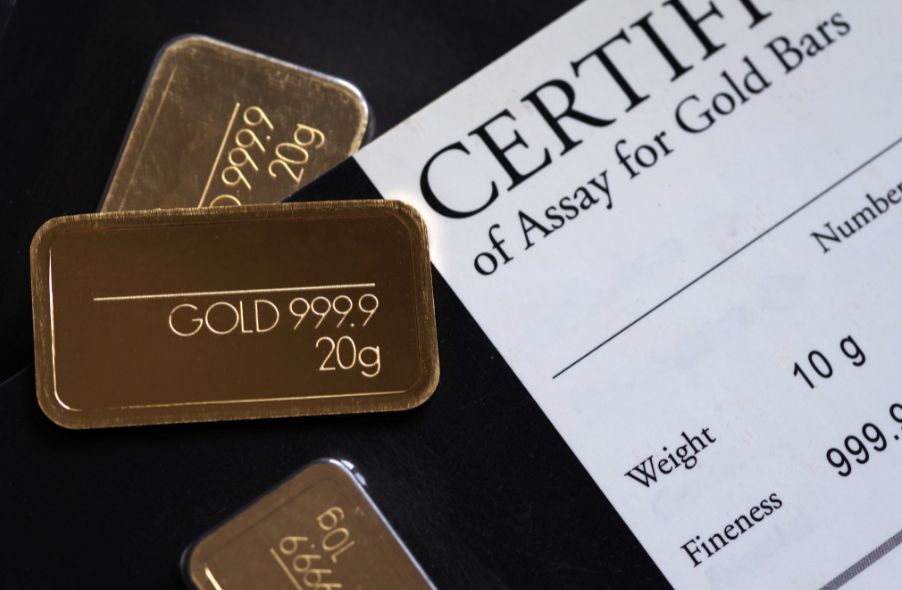Many people choose to invest in gold as a stable asset that has preserved its value since the dawn of civilization. However, the cost and logistics of storing a pile of gold bullion might deter some investors.
If that’s true for you, you might consider investing in paper gold. Of course, it doesn’t have to be an either-or choice. You can buy both physical gold and gold-backed securities for a robust, diverse investment portfolio.
Learn about paper gold, its benefits and potential risks, and how to decide whether it’s the right investment choice for you.
What Is Paper Gold?
Paper gold is any type of gold-backed asset that’s tied to the spot price of gold but doesn’t involve holding physical metal. Gold paper investments let you tap into the advantages of owning gold without the added markup of delivery, storage, and insurance prices.
Types of Paper Gold Investment
If you look into the paper gold market, you’ll see it includes different types of investments: ETFs, digital gold assets, certificates, and gold futures.
Gold Exchange-Traded Funds (ETFs)
Gold-backed ETFs work much like traditional stocks. The value of these assets is tied to the price of physical gold, rising or falling accordingly. ETF shares are easy to buy and trade through brokers.
Investing in gold ETFs means you purchase shares in the gold assets that the fund owns. If you choose to cash out your investment, you still won’t hold physical metal. Instead, you’ll get the money equivalent of your shares.
Physical Gold Certificates

Gold investment certificates let you own physical gold without holding it. Your asset is tangible metal stored in a physical vault, and the authority issuing gold certificates takes care of the storage and security.
Traditionally, banks and other financial companies issue such certificates. A more modern form of this investment is electronic gold trading. You can purchase gold bullion online from reputable companies and let the seller continue handling the storage. You can also trade your gold on digital platforms.
Gold Futures Contracts
When you buy gold futures, you agree to purchase a certain amount of physical gold at a specific time for a predetermined price. You don’t take hold of the metal right away, but rather at some future date.
Gold futures can be a short-term or a long-term investment. You can sell these contracts to someone else before you receive the physical metal or wait until the date you agreed to purchase the gold and take possession of the physical gold bullion.
Commodity Pools Accounts
Some paper gold investors choose the option of commodity pools, i.e., funds that gather, administer, and invest capital from a group of people or entities. A professional management team is responsible for running these pooled gold-backed securities.
Commodity pools offer higher liquidity and streamlined management. Investors can add up their resources to purchase different gold assets. Fund managers handle all investment decisions, which is convenient for those who want a low-maintenance setup.
What Is the Benefit of Using Paper Gold in Place of Physical Gold?

When you consider buying gold shares or certificates vs. bullion, it’s easy to see that paper gold offers some important perks, namely:
- Flexibility. You can invest however much or little money you’re willing to put into paper gold. With physical metal, you may need to buy in bulk to make delivery and storage costs practical.
- Liquidity. You can easily convert your ETF shares or futures contracts into cash when market conditions are favorable. Simply trade via a reputable stock exchange or online platform for a quick, convenient transaction.
- Fewer associated costs. When you buy paper gold, you don’t need to pay for shipping, a secure storage vault, or insurance. Your only markup would be the broker’s commission. In contrast, the costs of storing and insuring physical gold can add up over time.
- No storage concerns. You don’t need to worry about losing your precious metals or someone stealing your paper gold.
What Are the Risks of Paper Gold Investment?
On the other hand, if gold appeals to you as a stable asset with a steady intrinsic value, investing in paper gold may also come with some drawbacks:
- Dependence on other parties, such as the financial institution or fund that issued your gold-backed securities. If the organization runs into a crisis because of bad management or for other reasons, this may jeopardize your investment.
- Valuation gaps between the spot price of physical gold and your gold-backed assets. Tracking errors, management fees, and other factors could create a price discrepancy.
- Market volatility. Some gold-backed assets, like gold futures, are speculative in nature and may be more vulnerable to market ups and downs compared to physical gold.
- No physical metal ownership. When you buy paper gold, you don’t get the satisfaction and security of holding physical bullion.
Should You Still Invest in Physical Gold Today?

With the ease and flexibility of investing in paper gold, does it still make sense to buy physical precious metals? Despite the cost and logistics of shipping, storing, and insuring gold bullion, it still holds its ground as a safe hedge investment.
Pros of Physical Gold
When you purchase physical gold, you get:
- Ironclad intrinsic value. Although ETF shares and other paper gold assets are generally stable investments, their value may still suffer because of market trends or poor investment decisions. When you own physical gold, your asset’s value depends less on third parties.
- Stability. Gold prices may move up and down, but physical gold will always be a valuable commodity. Gold has held its value for millennia and will keep its worth even if modern currencies fall.
- Security. Unlike digital assets, physical gold isn’t vulnerable to hacking or cyber threats.
- Tradability. You can physically hold your gold bullion and exchange it practically anytime and anywhere. Thus, your gold coins or bars remain an accessible, tradable commodity even in a scenario of total economic collapse.
Cons of Physical Gold
On the other hand, owning physical gold involves some concerns, such as:
- Markup prices. Whether you choose to buy gold bars or coins, you’ll pay some markup on top of the metal’s spot price. Larger gold bars usually come with a lower markup but may also be more difficult to sell.
- Storage and insurance costs. When you buy a substantial amount of physical gold, secure storage is a must. You’ll likely need to pay annual fees to a gold depository and possibly purchase insurance to safeguard your precious metal.
- Risks like theft and natural disasters. If a burglar breaks into your vault and steals your bullion, you may lose your wealth unless it’s properly insured. The same is true if you lose your gold in a flood or another natural disaster.
- Slower liquidity. You can always find a buyer for physical gold, but it could take longer than trading ETF shares or digital gold assets. Additionally, you’ll likely have to pay a dealer’s fee when you sell gold bullion.
Factors To Consider When Choosing Between Physical Gold and Paper Gold

You don’t necessarily have to choose between paper gold and gold bullion. In fact, putting all your eggs in one basket could be a bad idea. With a diversified investment portfolio, you may enjoy profits when gold-backed securities rise in value but still preserve wealth when the market crashes. During an economic crisis, you can usually expect physical gold to appreciate in value while paper assets depreciate.
If you’re a seasoned investor with a sum of money you’re ready to direct into the gold market and you’re prepared to absorb a loss if your investment fails, gold ETF shares or futures could be a solid option for you. Of course, you should always consult an investment advisor before you put a significant amount into any gold venture.
On the other hand, if you like the idea of gold as the ultimate hedge investment that’s immune to market shifts, you may lean more toward purchasing physical gold. Gold bullion is a safe haven asset that can give you financial security when stocks and fiat currencies crash. It can help you save for retirement and provide for your heirs after you pass.
Choose Wisely When Investing in Paper Gold
If you buy gold ETF shares or another type of paper gold asset, it’s usually better to choose a fund that gets full backing from physical gold. This way, you’ll reduce any risks that come with improper management or bad investment decisions. Also, look into different investment options’ past returns and associated management costs.
Consider a Gold IRA
A gold IRA can combine the security of physical bullion with the convenience of paper gold. Since 1997, certain self-directed IRAs can hold physical precious metals like gold, silver, and platinum, not only precious metal shares and securities. Gold IRAs gained popularity following the 2008 financial crisis, which showed many people how unstable stocks and other paper assets can be.
Both physical gold and paper gold are attractive options, provided you choose an IRA partner that suits your needs. Complete our short questionnaire, and let us match you with some of the best IRA companies on the market.





